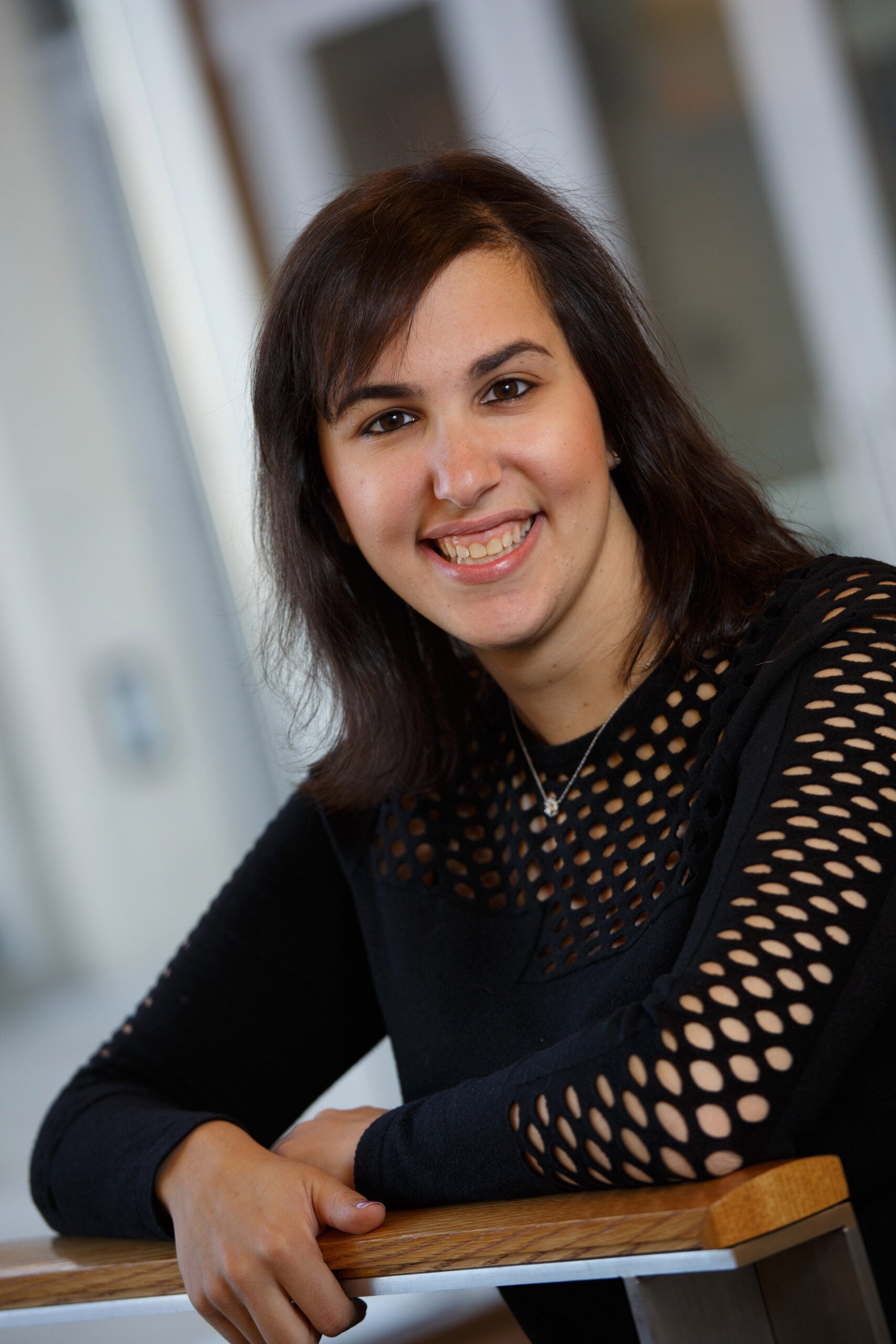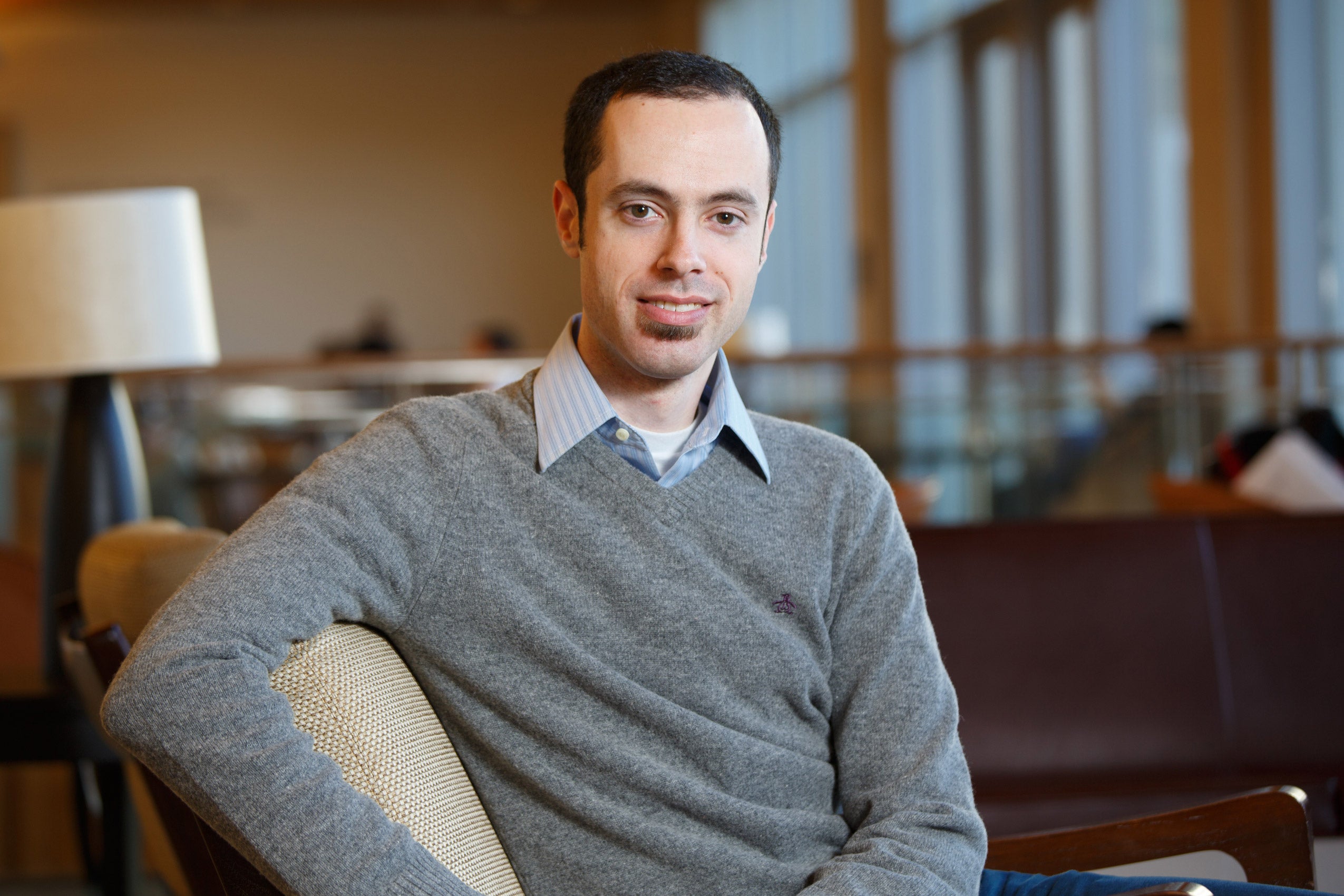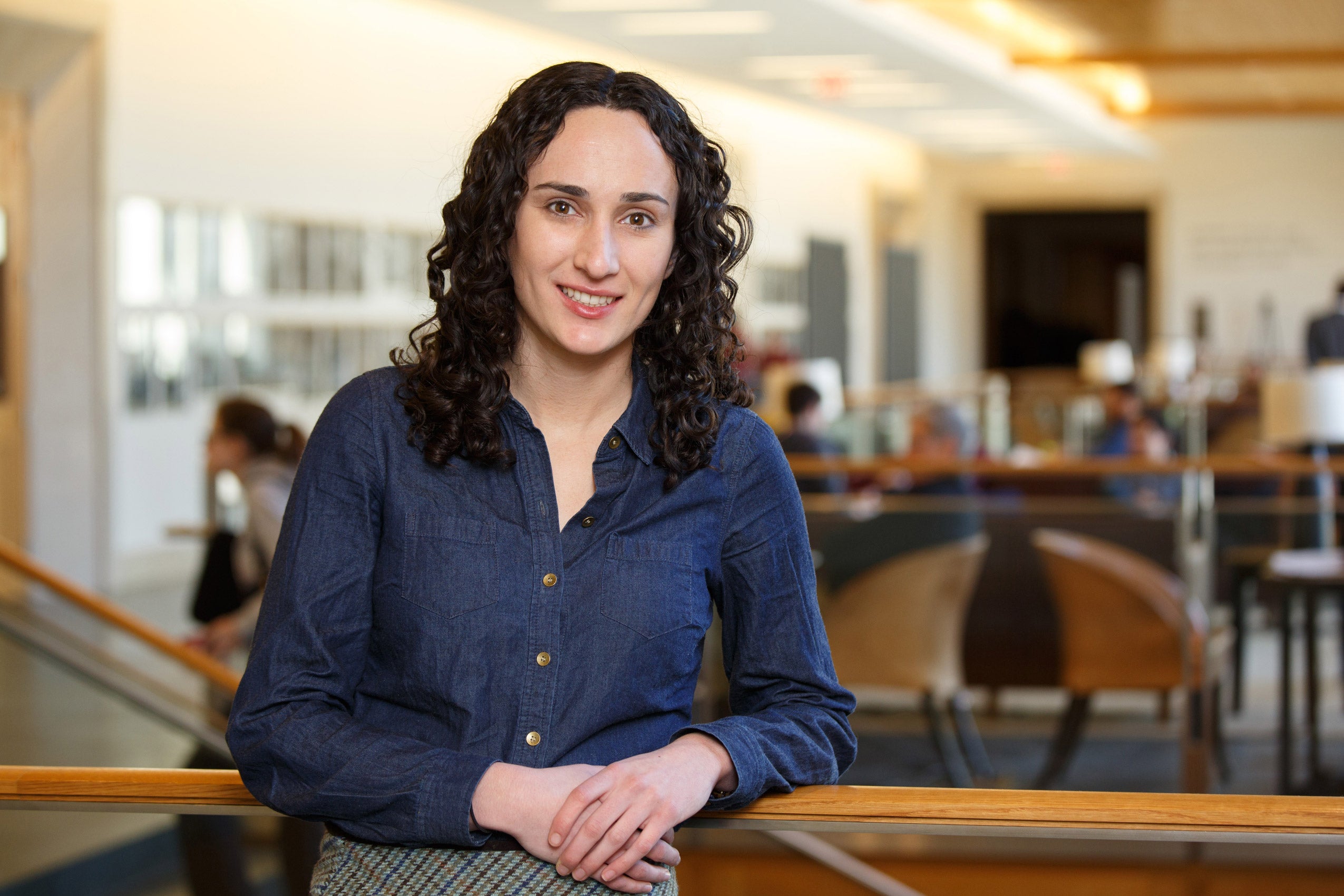For Harvard Law School’s recipients of the Cravath International Fellowship, January’s three-week winter term is a chance to immerse themselves in an academic project with an international, transnational, or comparative law focus. The experiences of three students illustrate the range and depth of the projects students pursue. Rebecca Matte ’14 worked on the rights of artists from Australia’s indigenous cultures. Gabriel Weiner ’15, researched the issues surrounding robotic weaponry in Israel. And Jessica Vosgerchian ’15, traveled to Geneva, Switzerland to examine WIPO, a specialized United Nations’ agency focused on the promotion of intellectual property.
Rebecca Matte ’14

In Rebecca Matte’s first year at HLS, Property with Professor Charles Donahue sparked her fascination with intellectual property (IP) law. “I majored in English in college, and love fiction and writing, so this perfectly combined those passions with the law, specifically copyright law as concerns the arts,” Matte said. She then took many courses with copyright and other intellectual property components, joined the Cyberlaw Clinic, and spent her summer employment in IP transactions and litigation at a New York law firm. When Matte heard about the opportunity for travel during winter term, she immediately saw it as a way to gain even more experience in the IP field.
Matte found a clinical placement in Sydney, Australia, at the Arts Law Centre, a not-for-profit organization providing legal advice, assistance, and advocacy to artists and arts organizations. “IP is becoming more and more international as the growth of the Internet makes borders useless,” she said. “Working at the Centre let me further develop my understanding of arts law in general and also familiarize myself with another country’s legal system.”
Matte rotated through four major areas: publications, case studies, education, and Artists in the Black (AITB). She homed in on AITB, which provides pro bono legal assistance and education to Aboriginal and Torres Strait Islander artists. “Traditional knowledge and expression are underdeveloped areas of IP law—how do you protect things like rock art, traditional song and dance, and spiritual sites?” she said. “These are sacred art forms, but they’re often copied by other artists or businesses because they fall outside of current laws.”
Upon her arrival at the Centre, Matte was assigned to work with AITB through each phase. To assist the Centre’s efforts to expand the protection of Indigenous Cultural and Intellectual Property, she examined dozens of case studies for relevant examples of artists whose work was not protected. That experience then informed her subsequent rotations, in which she simplified complex legal documents and created slideshows to educate artists about their rights and protections under the law. “The best way to share complicated legal concepts is through stories and examples, so I used many of the case studies I found in my first rotation to illustrate the concepts,” said Matte. These image-based slideshows, and the flow charts that Matte developed, will be incorporated into the Centre’s website and future educational efforts.
“I learned so much at the Centre, and am so grateful for the opportunity to work almost exclusively on AITB. This will absolutely inform my work in entertainment law, and hopefully I’ll add to the voices advocating for greater cultural sensitivity and protection of artists’ rights” Matte said.
Gabriel Weiner ’15

As a boy, Gabriel Weiner read and re-read Isaac Asimov’s Three Laws of Robotics and I, Robot. It was the beginning of his fascination with robots, which he pursued as an undergraduate at the University of California, Berkeley, studying the philosophy of artificial intelligence. After college, Weiner served in the Israeli Defense Forces and knew that his next step was to study the connection between robots and the law. Weiner followed his first year at HLS with a summer at Stanford Law School, researching legal issues surrounding autonomous driving.
During his 2L year, Weiner approached Professor Gabriella Blum LL.M. ’01 S.J.D. 03, teacher of his Laws of War class, about spending his winter term in Israel. “Israel is the leading country in robotic weapon systems, and with my prior experience there, it was the best place for me to really examine the real-world ethical and legal issues,” Weiner said. Blum connected Weiner with Pnina Sharvit-Baruch, whose team at the Israeli Institute for National Security Studies was preparing a report addressing autonomous weapon systems, the law of armed conflict, and potential international regulation.
Weiner spent a month in Tel Aviv, undertaking a comprehensive literature review, considering policy issues, and conceiving of scenarios in which robots could operate within the law of armed conflict. “It’s one thing to read about these principles and issues, but quite another to discuss them with former officials who have faced these actual scenarios in practice,” Weiner said.
Weiner is still working on defining and classifying autonomous weaponry systems, work which will help create the common language and classification system necessary for productive future debates, he said, adding that the time for those debates is now: “There have been calls for an outright ban, but this is a really important conversation to have, particularly if we hope to have any effective regulation,” Weiner said. “People have seen movies like ‘Terminator,’ and have a very negative gut reaction when they hear about robots fighting in a war. But robots aren’t passionate. They don’t make the same mistakes on the battlefield as humans—and there’s the potential for saving a lot of lives. There are obviously many ethical questions, but this technology is being developed now—and we need to engage in these conversations.”
Weiner hopes to participate in a weapons conference this spring and to continue expanding his expertise in the field. “Listening, discussing, and learning in the place where this technology is in development made me even more certain that I want to work in this area as much as possible,” he said. “Whether internationally in an NGO or in a government organization or academically—I want to contribute to this discussion.”
Jessica Vosgerchian ’15

Jessica Vosgerchian’s undergraduate study of cyberlaw cemented her decision to pursue law school, and she was particularly excited by the resources of the Berkman Center for Internet & Society. After a summer placement at the Computer Crime & Intellectual Property Section of the U.S. Department of Justice, Vosgerchian took additional cyberlaw coursework, honing her focus to public international law and intellectual property.
Vosgerchian became interested in the activities of the United Nations’ World Intellectual Property Organization (WIPO) and its contentious 2013 annual assembly. “The assembly ended in a stalemate,” she said. “They were unable to reach any decision on the forthcoming program or budget. Several delegates declared it a ‘disaster’ and a ‘crisis of governance’—I was immediately consumed with one question: What on earth happened?”
The Cravath International Fellowship enabled Vosgerchian to travel to the home of WIPO in Geneva, Switzerland, to investigate both the particulars of the stalemated assembly and the schism that she saw between nations with established IP economies and those in the early stages of utilizing IP as a tool for national development. Vosgerchian’s faculty advisor and cyberlaw professor, Christopher Bavitz, with Professors Urs Gasser LL.M. ’03 and Terry Fisher ’82, connected her with two WIPO experts and Professor Jacques de Werra, an international IP specialist at the University of Geneva and former HLS Visiting Scholar. Through those connections, Vosgerchian interviewed WIPO delegates and staffers, NGO workers, journalists, and international law scholars, and she attended the WIPO Conference on Open Innovation. “So many of the real decisions were being made in person, through unrecorded conversations—the primary research materials just weren’t enough,” Vosgerchian said. “Going to talk with the people involved was vital.”
Vosgerchian is writing a paper, which she will submit for publication, about how the conflicts in WIPO treaty proposal negotiations symbolize larger trends in all of the organization’s activities. “The treaty is procedural, and should be non-controversial, but every step of the development process has been rife with conflict between developed and developing nations,” Vosgerchian said.
Traveling to Geneva to interview participants was a pivotal step in her research. “It was tremendous to see the WIPO in action,” Vosgerchian said. “It really helped flesh out my understanding of international law. And now I can better scrutinize our own laws and the presumptions on which they are based.”
The Cravath International Fellowships provide funding to a select number of HLS students to pursue academic projects with an international, transnational, or comparative law focus. The Fellowships were created in 2007 by a group of partners and HLS alums at Cravath, Swaine & Moore, led by Sam Butler ’54 and the late Robert Joffe ’67.